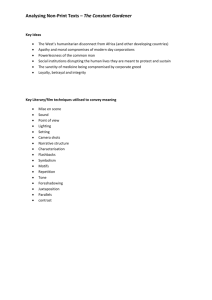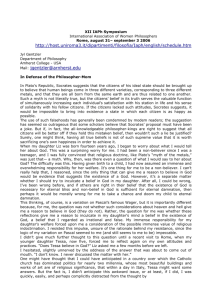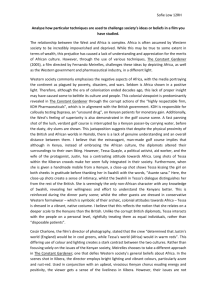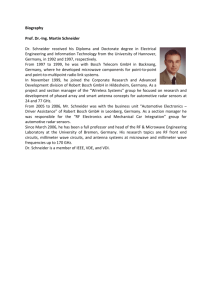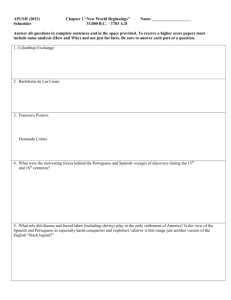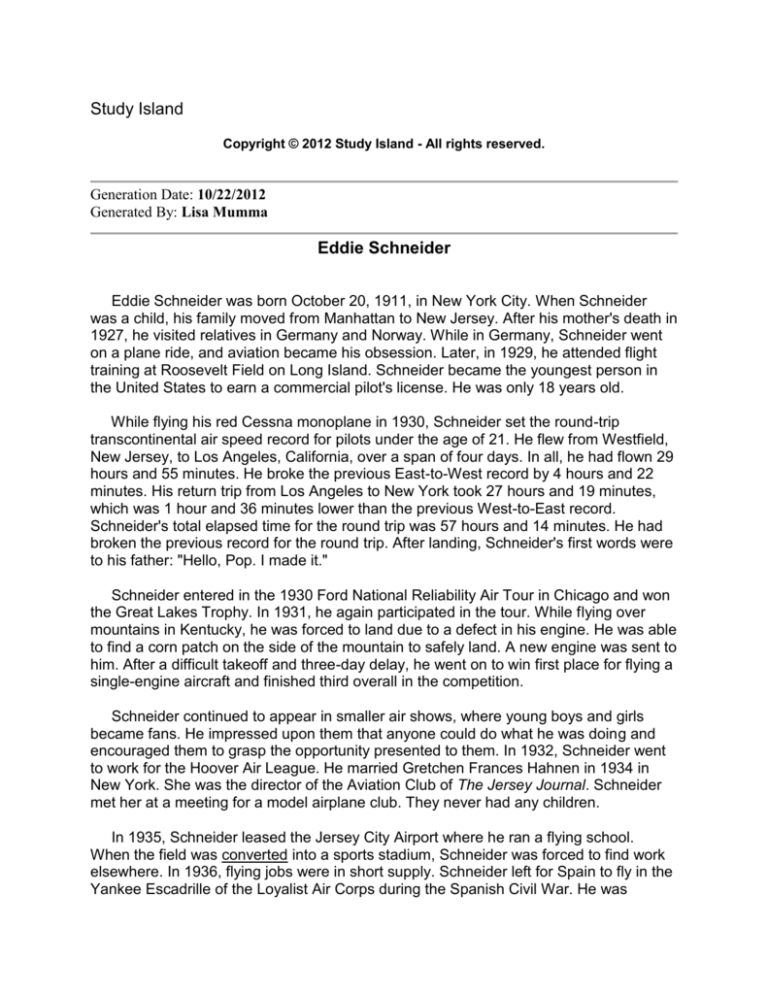
Study Island
Copyright © 2012 Study Island - All rights reserved.
Generation Date: 10/22/2012
Generated By: Lisa Mumma
Eddie Schneider
Eddie Schneider was born October 20, 1911, in New York City. When Schneider
was a child, his family moved from Manhattan to New Jersey. After his mother's death in
1927, he visited relatives in Germany and Norway. While in Germany, Schneider went
on a plane ride, and aviation became his obsession. Later, in 1929, he attended flight
training at Roosevelt Field on Long Island. Schneider became the youngest person in
the United States to earn a commercial pilot's license. He was only 18 years old.
While flying his red Cessna monoplane in 1930, Schneider set the round-trip
transcontinental air speed record for pilots under the age of 21. He flew from Westfield,
New Jersey, to Los Angeles, California, over a span of four days. In all, he had flown 29
hours and 55 minutes. He broke the previous East-to-West record by 4 hours and 22
minutes. His return trip from Los Angeles to New York took 27 hours and 19 minutes,
which was 1 hour and 36 minutes lower than the previous West-to-East record.
Schneider's total elapsed time for the round trip was 57 hours and 14 minutes. He had
broken the previous record for the round trip. After landing, Schneider's first words were
to his father: "Hello, Pop. I made it."
Schneider entered in the 1930 Ford National Reliability Air Tour in Chicago and won
the Great Lakes Trophy. In 1931, he again participated in the tour. While flying over
mountains in Kentucky, he was forced to land due to a defect in his engine. He was able
to find a corn patch on the side of the mountain to safely land. A new engine was sent to
him. After a difficult takeoff and three-day delay, he went on to win first place for flying a
single-engine aircraft and finished third overall in the competition.
Schneider continued to appear in smaller air shows, where young boys and girls
became fans. He impressed upon them that anyone could do what he was doing and
encouraged them to grasp the opportunity presented to them. In 1932, Schneider went
to work for the Hoover Air League. He married Gretchen Frances Hahnen in 1934 in
New York. She was the director of the Aviation Club of The Jersey Journal. Schneider
met her at a meeting for a model airplane club. They never had any children.
In 1935, Schneider leased the Jersey City Airport where he ran a flying school.
When the field was converted into a sports stadium, Schneider was forced to find work
elsewhere. In 1936, flying jobs were in short supply. Schneider left for Spain to fly in the
Yankee Escadrille of the Loyalist Air Corps during the Spanish Civil War. He was
promised to be paid $1,500 each month and given a bonus of $1,000 for every rebel
plane he shot down. This was a large amount of money for an aviator during this time.
Schneider was never paid, so he returned to America less than two months later.
In 1940, Schneider put his mechanic skills to use by accepting a job with American
Airlines, but he really wanted to fly. He later worked as civilian instructor with the Archie
Baxter Flying Service.
On December 23, 1940, Schneider was killed in an airplane accident at Floyd
Bennett Field at age 29. While training George Wilson Herzog, a United States Naval
Reserve biplane struck Schneider's Piper Cub. The mid-air collision forced Schneider's
plane into a tight spin. The plane crashed and sunk into Deep Creek. Both Herzog and
Schneider were dead at the scene of impact. After investigating the accident, the Civil
Aeronautics Board ruled that the bomber pilot was at fault for flying too low and for
failing to observe the traffic in front of him. Schneider was buried in Fairview, New
Jersey.
1. What effect does the text organization have on the passage?
A. It allows the reader to understand the nature of Schneider's relationship with his wife.
B. It helps the reader to understand the sequence of events that occurred in Schneider's life.
C. It helps the reader to understand Schneider's motives for spending so little time in Spain.
D. It helps the reader to understand solutions to problems that Schneider had during his life.
2. How does the author's use of biography as a literary form influence the meaning of the
passage?
A. The biography form permits the use of facts to support opinions.
B. The biography form allows for a focus on the events in a person's life.
C. The biography form requires the use of flashback and foreshadowing.
D. The biography form permits instructions to be conveyed clearly.
3. Which statement from the passage best supports the generalization that following one's dream
can lead to success and achievements?
A. "While flying over mountains in Kentucky, he was forced to land due to a defect in his
engine."
B. "He was promised to be paid $1,500 each month and given a bonus of $1,000 for every
rebel plane he shot down."
C. "While in Germany, Schneider went on a plane ride, and aviation became his obsession."
D. "While flying his red Cessna monoplane in 1930, Schneider set the round-trip
transcontinental air speed record for pilots under the age of 21."
4. Which word best describes Schneider?
A. resentful
B. ambitious
C. lively
D. conceited
5. Which word is a synonym for converted?
A. polluted
B. transformed
C. duplicated
D. marketed
One and Only:
A Look at Only Children
by Heather Harper
What do Leonardo DiCaprio, Franklin Delano Roosevelt, and Joseph Stalin all have
in common? They were all "onlys"—the only child in the family. Over the years,
psychologists have debated the influence that being an only child can have on a
person's life. Some psychologists insist that the order in which children are born into a
family decide everything about their personalities, while others say that it has little or no
effect. Despite the difference in opinion, one thing is clear: researchers have been
fascinated by the subject of only children for decades.
The Power of One
Described as "self-centered," "arrogant," and "spoiled," only children often suffer
from unflattering stereotypes. Sigmund Freud, the father of psychoanalysis, wrote that
only children were prone to identity problems. G. Stanley Hall, an early American child
psychologist, even went so far as to say that "Being an only child is a disease in itself."
Though these viewpoints are extreme, child psychologists do agree that only children
can be more critical and have more difficulty sharing than those with siblings.
Despite the stigma, "onlys" enjoy many positive qualities as a result of their single
status. For example, they generally have more self-confidence. Only children do not
have trouble making decisions and are at ease with their opinions. They are punctual
and tend to be well-organized. In addition, "onlys" tend to possess slightly more
advanced verbal skills and go farther in school—all advantages psychologists believe
stem from more parental involvement and more time with adults.
Attack of the Onlys
Since the 1980s, the number of single-child families has steadily increased. But the
theoretical benefits that only children may enjoy are just one factor in the growing
numbers of "onlys." With more women in the workplace than ever before, many parents
choose to have only one child so that they may balance careers and family life more
easily. For some families, it is a matter of economics. Raising one child is less
expensive than raising two. Whatever the reason, the increase in one-child families is
significant:
One-child families make up 17% of British families, and as much as half of
families in Germany and Portugal.
30 to 40% of children in Manhattan are "onlys."
Between 1980 and 1998, there has been an 85% increase in the number of U.S.
women having only one child.
Only the Lonely?
One argument against having a single-child family is that only children are often
lonely. Years ago, when families often lived far apart, siblings were the only way a child
could learn how to interact with others. Most psychologists agree, however, that this is
no longer the case. In today's society, it is easier for kids to get together with others for
play dates. Also, the rapidly growing trend toward one-child families means "onlys" will
find lots of other single children with whom they can relate!
6. Based on information in the passage, why do some parents choose to have only one child?
A. They want to be able to spend more time and attention with one child.
B. They want to make scheduling play dates with other families easier.
C. They want to be able to balance careers and family more easily.
D. They want to enable one of the parents to stay at home and not work.
7. What is the main idea of the section titled "Only the Lonely?"
A. Raising multiple children is too expensive for most families.
B. Only children have more self-confidence than other children.
C. In today's society, only children are no longer lonely.
D. Parents should not plan on having a single-child family.
8. What is the author's purpose in writing the passage?
A. to inform the audience about famous people who are without brothers or sisters
B. to offer the audience an overview of the unique aspects of being an only child
C. to offer explanations of the reasons why only children have high self-confidence
D. to tell the audience that researchers are fascinated with families with one child
9. The author would most likely agree with which statement?
A. Parents of only children frequently report behavior problems.
B. There are advantages and disadvantages to being an only child.
C. Manhattan has a higher rate of bad behavior in only children.
D. Most only children have a challenging time making new friends.
10. Read the sentence from the passage.
"Despite the stigma, 'onlys' enjoy many positive qualities as a result of their single
status."
What does the word stigma mean as it is used in the sentence?
A. spoiled children
B. bad reputation
C. weird thought
D. lack of siblings
My Doves
by Louisa May Alcott
Opposite my chamber window,
On the sunny roof, at play,
High above the city's tumult,
Flocks of doves sit day by day.
Shining necks and snowy bosoms,
Little rosy, tripping feet,
Twinkling eyes and fluttering wings,
Cooing voices, low and sweet,—
Graceful games and friendly meetings,
Do I daily watch to see.
For these happy little neighbors
Always seem at peace to be.
On my window-ledge, to lure them,
Crumbs of bread I often strew,
And, behind the curtain hiding,
Watch them flutter to and fro.
Soon they cease to fear the giver,
Quick are they to feel my love,
And my alms are freely taken
By the shyest little dove.
In soft flight, they circle downward,
Peep in through the window-pane;
Stretch their gleaming necks to greet me,
Peck and coo, and come again.
Faithful little friends and neighbors,
For no wintry wind or rain,
Household cares or airy pastimes,
Can my loving birds restrain.
Other friends forget, or linger,
But each day I surely know
That my doves will come and leave here
Little footprints in the snow.
So, they teach me the sweet lesson,
That the humblest may give
Help and hope, and in so doing,
Learn the truth by which we live;
For the heart that freely scatters
Simple charities and loves,
Lures home content, and joy, and peace,
Like a soft-winged flock of doves.
11. How does the author's style help to create the tone of the passage?
A. The complex language creates an informal tone.
B. The sarcastic language creates an irritated tone.
C. The objective language creates an informative tone.
D. The descriptive language creates a reflective tone.
12. How does the reader know that the passage is a poem rather than a drama?
A. The author uses point of view.
B. The author uses alliteration.
C. The author uses stanzas.
D. The author uses figurative language.
13. Based on information in the passage, which conclusion can be made about how the speaker
feels about the doves?
A. The doves are more faithful than friends.
B. The speaker feels the doves are a nuisance.
C. The doves should build a nest on the roof.
D. The speaker feels sorrow for the doves.
14. Read these lines from the passage.
"But each day I surely know
That my doves will come and leave here
Little footprints in the snow."
What is the effect of the imagery used to describe the doves?
A. It suggests the time of year that the speaker is feeding the birds.
B. It implies that the speaker feels uncomfortable around the doves.
C. It emphasizes the differences between the speaker and the doves.
D. It shows that the speaker is feeding the doves too much bread.
15. What is the author's purpose in writing the passage?
A. to explain how a simple kindness can create a friendship
B. to tell why birds often enjoy crumbs left by people
C. to show that the speaker was able to tame wild animals
D. to describe how birds act friendly to get extra food
16. Read these lines from the passage.
Peep in through the window-pane;
Stretch their gleaming necks to greet me,
Peck and coo, and come again.
How does the poet's use of imagery in these lines help to communicate an idea?
A. It provides objective information that illustrates how hungry the doves are.
B. It establishes the speaker's feelings about the visit from the doves.
C. It provides a vivid description that portrays the curiosity of the doves.
D. It provides a general description that suggests how beautiful the doves are.
17. The speaker suggests that as the doves begin taking crumbs of bread, they
A. move into the speaker's chamber.
B. attack the speaker out of anger.
C. stop visiting the speaker's window.
D. stop being afraid of the speaker.
Automated to Death
by Teresa R. Herlinger
I want to lodge a complaint, but I sure won't call Customer Service to do it. I've
found myself stuck in never-ending voicemail loops quite enough lately, thank you.
Just as computers haven't reduced our mountains of paper, the latest in telephone
technology has done the opposite of improving communication between people. All
we've really done is proven the inefficiency of "automation" when it comes to complex
humans with our sophisticated needs. How many times have you felt left out by a list of
voicemail choices? "Please choose one of the following five options . . ." All of humanity
cannot be lumped into five neat categories.
Sadly, in our rush to fully automate, we're paying an even higher price than
inefficiency. Our daily business transactions have become devoid of anything personal
or human. Recently, I made an unsettling discovery: I can go through an entire day,
even a week, of working (at home on my computer), shopping, and taking care of
business without ever talking to a single human being. Phone technology—
computerized voices, automated options—doesn't put us in touch; it cuts us off from
humanity.
Here's another major grievance of mine: the total lack of originality. No matter the
type of business, all automated options sound exactly the same. Too bad the guy who
came up with the idea of automated options didn't get a patent. He'd be rich now for this
line alone: "All of our representatives are currently assisting other customers." How
often in the last week have you had to listen to that line?
I'm not advocating the return of the busy signal—that would drive most of us batty
with our addictive need to reach people at any time of the day or night. No, I'm just
asking for a little creativity—a little of what makes us human. Dare to deviate from the
outgoing messages of other businesses, and offer me a voicemail option to make my
day: "If you'd like to bypass our entire spiel—since you've heard it all before—please
press the star key to speak to a live human (unless he's stepped out to go to the
bathroom, in which case he'll be right back)."
18. Which sentence from the passage contains an opinion?
A. "How often in the last week have you had to listen to that line?"
B. "I want to lodge a complaint, but I sure won't call Customer Service to do it."
C. "How many times have you felt left out by a list of voicemail choices?"
D. "Sadly, in our rush to fully automate, we're paying an even higher price than inefficiency."
19. What is the effect of the first person point of view in the passage?
A. It gives an entertaining account of the author's influence on others.
B. It provides a thorough understanding of the author's opinions.
C. It provides a historical account of technological advancements.
D. It gives an objective view of the benefits of phone technology.
20. When the author wrote that "All of humanity cannot be lumped into five neat categories," she
probably meant that
A. many people would like automated phone systems to give them fewer choices.
B. some people get very confused when they are offered too many options.
C. automated phone systems offer individual customers a way to get information.
D. companies' voicemail options do not address all the problems people have.
21. Why does the author use quotes from typical automated messages?
A. to show how impersonal the messages are to individuals
B. to demonstrate the benefits of the messages for callers
C. to emphasize that the messages are inferior to busy signals
D. to prove how the messages provide solutions to callers
22. The author would most likely agree with which statement?
A. Most people go through a day without speaking to a human.
B. Technological advancements have cut us off from humanity.
C. Computerized voices are pleasant, friendly, and comforting.
D. Every automated voicemail system uses the same five options.
The Perfect Match
by Teresa Herlinger
As the Jackson High Varsity Tennis Team bus neared the old brick buildings of Emily
Grant Seminary, Tessa's adrenaline started to pump as it always did before a match.
"Okay, let's get a move on, girls," Coach Willie Wilkerson said as he ushered
everyone off the bus and down the path to the courts where the girls from Grant were
warming up.
Coach Sturgis was dressed in a gray business suit, her arms folded sternly as she
watched her girls perform drills.
Tessa recognized the girl practicing overhead smashes, nailing every serve with
expert precision—it was Shu-Shu, a girl she'd played twice before and lost to both
times.
Then Coach Sturgis called in the team, and Tessa was pleased to learn she was
matched up with Shu-Shu yet again.
There weren't enough courts for everyone, so Shu-Shu and Tessa were sent to play
at some public courts nearby.
"You're a senior, right?" Tessa asked as they unsheathed their rackets.
"Yes, this is my last season playing for Grant."
"Are you sad about it?"
Shu-Shu shrugged. "Not really. There's so much more to life outside the gates of
Emily Grant." And with that, Shu-Shu picked up two balls and headed onto the court.
The two players matched each other nearly point for point. Shu-Shu led for most of
the set, but Tessa showed her resilience and fought back until the set score was 5–5 (or
tied). Tessa was now serving to take the lead.
At game point, Tessa noticed that Shu-Shu kept checking her watch. Tossing the
ball high, Tessa gave it all she had. Ace! Shu-Shu hadn't even moved. "I'm sorry,"
Tessa said. "Were you ready?"
"Yeah, sure," Shu-Shu answered, sounding a bit distracted. "Nice serve!" she added
as they switched sides and Tessa handed her the balls to serve.
If she could just win this next game, Tessa thought they'd have one set apiece and
would have to play a third to decide the match. Just then, the two coaches came down
the path. Taking advantage of the break between games, Shu-Shu went to talk to her
coach. Tessa watched from the baseline as Shu-Shu appeared to be explaining
something. Coach Sturgis was shaking her head angrily.
Back on the court, Shu-Shu got ready to serve. "5–6," she announced and powered
one of her strongest serves to Tessa's backhand. Tessa barely got the tip of her racket
on it as it sailed past.
On the next point, Tessa returned the serve with a cross-court winner. Then she
killed the next two points, charging the net and putting away anything Shu-Shu could
throw at her.
It was set point. "30–40," Shu-Shu said, tossing the ball high and serving a zinger
down the center line. Tessa took a chance. She pulled her racket underneath and
across the ball, giving it an underspin or "slice." Shu-Shu ran for it, but the ball hit the
ground and darted sideways out of her reach. Tessa had won the set! It was 1–all!
Shu-Shu and Coach Sturgis gathered at the bench and called Coach Willie and
Tessa over.
"Is there a problem?" Tessa's coach asked.
"I'm afraid I have to leave," Shu-Shu said. "I can't finish the match."
"But why?" Tessa asked.
"I have a test to take," Shu-Shu answered, "to get my pilot's license. I have to leave
right now—I'm so sorry, Tessa."
Then Coach Sturgis spoke. "Your choice is clear, Shu-Shu. You can take the test—
let down all your teammates and this young woman here—or you can stay and live up
to your responsibilities to this team."
"You know my answer, Coach," Shu-Shu said.
"Then you'll not play with this team again," her coach said.
But Shu-Shu didn't hesitate.
"I've been waiting my whole life for this, and I'm not going to pass up my chance
now." And with that, she excused herself and went to gather her things.
Tessa ran after her. She caught up with her at the top of the hill and walked her to
her pickup truck.
"I wish I could stay," Shu-Shu said.
"I understand," said Tessa. "Actually, I envy you. You know exactly what you want to
do, what you want to be. Me, I just know I love tennis."
"Then keep playing it," Shu-Shu said, smiling. "You'll figure out the rest—what to do
with your life. There's plenty of time."
Tessa found she wanted to tell her friend what the day had meant to her. "Shu-Shu,
that was so incredible! I'll never forget it. It was . . ." She struggled for the word, and
Shu-Shu found it for her:
"Perfect."
Tessa watched as her friend drove across the parking lot in pursuit of a new and
exciting future. Shu-Shu was the most courageous person Tessa had ever known.
Tessa smiled and turned to walk down the hill where her team awaited her.
23. Which sentence from the passage best represents the conflict?
A. "Tessa found she wanted to tell her friend what the day had meant to her."
B. " 'There's so much more to life outside the gates of Emily Grant.' "
C. " 'I have to leave right now—I'm so sorry, Tessa.' "
D. "Tossing the ball high, Tessa gave it all she had."
24. Which word best describes Shu-Shu?
A. grouchy
B. decisive
C. envious
D. unfriendly
25. Which excerpt from the passage reveals Shu-Shu's sense of priorities?
A. " 'Yes, this is my last season playing for Grant.' "
B. " 'Nice serve!' she added as they switched sides and Tessa handed her the balls to serve."
C. " 'Not really. There's so much more to life outside the gates of Emily Grant.' "
D. " '5—6,' she announced and powered one of her strongest serves to Tessa's backhand."
26. Which universal theme is most reflected in the passage?
A. Doing what others ask will bring you happiness.
B. Friends cannot always be trusted to keep promises.
C. You must face the consequences of your choices.
D. You must always look out for others before yourself.
27. Which statement best characterizes Shu-Shu's attitude toward tennis?
A. She enjoys tennis, but it is not the most important thing in her life.
B. She knows she is good at tennis, and she wants to play it professionally.
C. She is pretty good at tennis, and she knows her coach wants to help her.
D. She thinks tennis is pretty fun, but she wishes she could play other sports.
28. What does the word precision mean as used in the passage?
A. enthusiasm
B. buoyancy
C. accuracy
D. reproach
29. Which sentence best describes the relationship of the setting to the plot in the passage?
A. The setting is important only in the beginning.
B. The setting is not important to the climax.
C. The setting influences Tessa's decision in the end.
D. The setting contributes to the main source of conflict.
30. Based on the passage, which American cultural idea is most emphasized?
A. pursuit of happiness
B. love for land
C. right to vote
D. frugality
Answers
1. B
2. B
3. D
4. B
5. B
6. C
7. C
8. B
9. B
10. B
11. D
12. C
13. A
14. A
15. A
16. C
17. D
18. D
19. B
20. D
21. A
22. B
23. C
24. B
25. C
26. C
27. A
28. C
29. D
30. A

